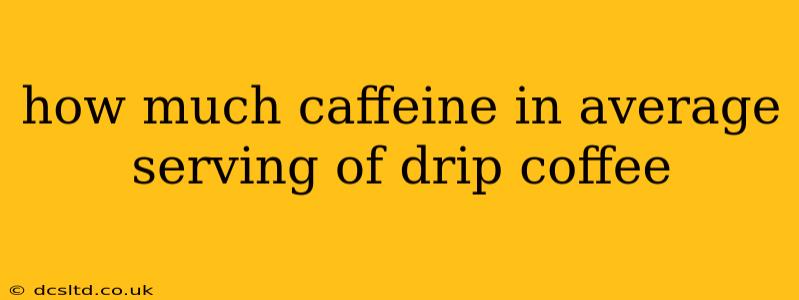The caffeine content in a cup of drip coffee is a frequently asked question, and the answer isn't a simple number. It varies significantly depending on several factors. This comprehensive guide will explore these factors and provide a clearer picture of the caffeine you're likely consuming.
Understanding the Variables Affecting Caffeine Content
Several crucial factors influence the caffeine level in your drip coffee:
- Bean Type: Arabica beans generally contain less caffeine than Robusta beans. Many coffee blends use a mix of both, influencing the final caffeine amount.
- Roast Level: Lighter roasts tend to retain more caffeine than darker roasts, although the difference isn't always drastic. The roasting process does affect caffeine concentration, but not as much as the bean type.
- Grind Size: A finer grind can extract more caffeine because of increased surface area in contact with the water. However, this effect is often minimal compared to bean type and roast.
- Brewing Method: While we're focusing on drip coffee, the brewing method significantly impacts caffeine extraction. Drip coffee typically extracts a moderate amount, sitting between methods like espresso (higher concentration) and cold brew (generally lower).
- Bean-to-Water Ratio: A stronger brew (more coffee grounds per cup of water) naturally contains more caffeine.
- Coffee Bean Source & Processing: Even within the same bean type, differences in growing conditions, processing methods, and even the specific farm can alter caffeine content.
How Much Caffeine is Typically Found in Drip Coffee?
While precise quantification is impossible without knowing the specific factors listed above, a general estimate for an 8-ounce (237ml) cup of drip coffee is between 80 and 150 milligrams (mg) of caffeine. This range is quite broad, highlighting the variability. Some cups might contain less, while others could exceed 150mg.
What About Larger or Smaller Servings?
The caffeine content scales proportionally with the serving size. So, a 16-ounce cup might contain roughly double the caffeine of an 8-ounce cup. Conversely, a smaller serving will have less caffeine.
What are the Effects of Caffeine?
Caffeine is a stimulant that affects the central nervous system. Common effects include increased alertness, improved mood, enhanced physical performance, and suppressed appetite. However, excessive caffeine intake can lead to anxiety, restlessness, insomnia, and digestive issues. Individual sensitivity to caffeine also varies greatly.
How Does the Caffeine Content in Drip Coffee Compare to Other Beverages?
Here's a quick comparison to give you some perspective:
- Espresso: Generally higher caffeine concentration than drip coffee per ounce, although a single shot might contain a similar amount to a small drip coffee.
- Instant Coffee: Usually contains less caffeine than drip coffee, but this can also vary greatly depending on the brand and preparation.
- Tea: The caffeine content in tea varies significantly depending on the type and brewing time, often containing less caffeine than drip coffee, but sometimes comparable.
- Energy Drinks: These usually contain significantly more caffeine than a cup of drip coffee.
How Can I Reduce the Caffeine in My Drip Coffee?
If you are sensitive to caffeine or are trying to reduce your intake, here are a few options:
- Choose Arabica Beans: Opt for Arabica beans over Robusta beans.
- Use a Lighter Grind: A coarser grind will extract less caffeine.
- Reduce the Brew Time: Shorter brew times can result in less caffeine extraction.
- Dilute Your Coffee: Add more water to your brewed coffee to reduce the concentration.
- Try Decaf Coffee: Decaf coffee still contains some caffeine, but significantly less than regular coffee.
This information is intended for general knowledge and should not be considered medical advice. If you have concerns about your caffeine intake or its effects on your health, consult a healthcare professional.
